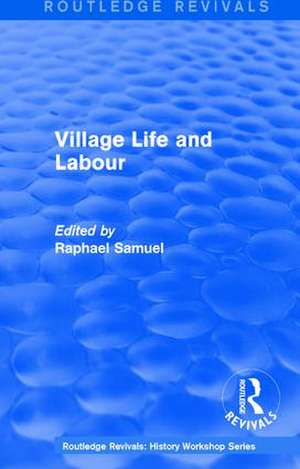Routledge Revivals: Village Life and Labour (1975): Routledge Revivals: History Workshop Series
Editat de Raphael Samuelen Limba Engleză Hardback – 11 aug 2016
Preț: 819.90 lei
Preț vechi: 1102.79 lei
-26% Nou
Puncte Express: 1230
Preț estimativ în valută:
156.88€ • 164.39$ • 129.70£
156.88€ • 164.39$ • 129.70£
Carte tipărită la comandă
Livrare economică 11-25 aprilie
Preluare comenzi: 021 569.72.76
Specificații
ISBN-13: 9781138213548
ISBN-10: 1138213543
Pagini: 302
Ilustrații: 16
Dimensiuni: 138 x 216 mm
Greutate: 0.45 kg
Ediția:1
Editura: Taylor & Francis
Colecția Routledge
Seria Routledge Revivals: History Workshop Series
Locul publicării:Oxford, United Kingdom
ISBN-10: 1138213543
Pagini: 302
Ilustrații: 16
Dimensiuni: 138 x 216 mm
Greutate: 0.45 kg
Ediția:1
Editura: Taylor & Francis
Colecția Routledge
Seria Routledge Revivals: History Workshop Series
Locul publicării:Oxford, United Kingdom
Cuprins
Notes on contributors; General editor’s introduction: people’s history; Acknowledgments; Part 1 Village Labour Raphael Samuel; Notes; Part 2 The place of harvesters in nineteenth-century village life David H. Morgan; 1 The crowded fields 2 Harvest earnings 3 The harvest contract 4 Gleaning 5 The coming of the machine Glossary of harvest terms Notes; Part 3 Country work girls in nineteenth-century England Jeannie Kitteringham; 1 The country work girl 2 Farm work 3 Gangs 4 Rural identities 5 Moralities Notes; Part 4 ‘Quarry roughs’: life and labour in Headington Quarry, 1860-1920. An essay in oral history Raphael Samuel; 1 ‘Quarry roughs’ 2 Work 3 Secondary incomes 4 Totting and poaching, woodland and waste 5 Wage labour and capital Notes; Subject index; Index of places
Descriere
First published in 1975, this volume aims to direct attention at a number of aspects of the lives and occupations of village labourers in the nineteenth-century that have been little examined by historians outside of agriculture. Some of the factors examined include the labourer’s gender, whether they lived in ‘closed’ or ‘open’ villages and what they worked at during the different seasons of the year. The author examines a range of occupations that have previously been ignored as too local to show up in national statistics or too short-lived to rank as occupations at all as well as sources of ‘secondary’ income.











